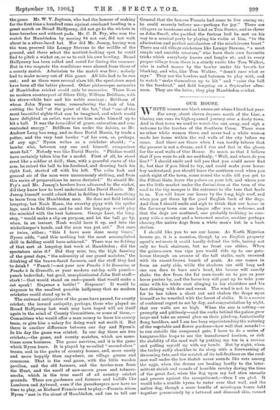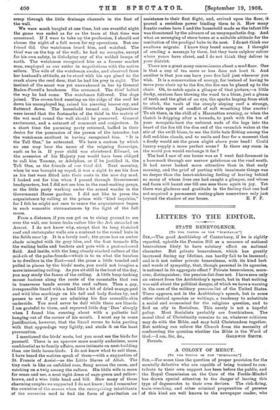OUR HOUSE.
WHITE women are black swans out where I lived last year, Far away, about eleven degrees north of the Line, blazing sun runs its high-spanned journey over a dusty town. And in that town we used to watch the sun away, and sigh a welcome to the torches of the Southern Cross. There were no other white women there, and never bad a white woman made her home within the red walls of the city before we came. And there are times when I can hardly believe that the present is not a dream, and I rise and feel in the gloom for the mud walls of Our House. So much so that I believe that if you were to ask me suddenly, " Well, and where do you live ?" I should smile and tell you that you could never find it; but that if you liked to try, and could make your horse- boy understand, you should leave the southern road when you catch sight of the town, come round the walls till you get to the Fillani Gate, leave the palace on your left, and where you see the little market under the durimi-tree at the turn of the road to the big mosque is the entrance to the lane that leads to us. You will know our house by the long, high roof, and when you get there by the good English bark of the dogs. And then I should smile and sigh to think that our house in the far-away town can no longer offer you a welcome, and that the dogs are scattered, one probably trekking in com- pany with a monkey and a borrowed master, another perhaps chasing the native dogs from a white man's but in a bush station.
I should like you to see our house. As North Nigerian houses go, it is a mansion, though by an English property agent's estimate it could hardly defend the title, having not only no back staircase, but no front one either. When the guinea-corn was ripe you would ride up to our gate- house through an avenue of the tall stalks, each crowned with its russet-brown bunch of grain. As one comes In from an early ride, while the shadows are still long and one can dare to bare one's bead, the breeze will saucily shake the dew from the fat corn-heads on to you as your horse pushes by, and the horse-boy will pant up to take your reins with his white coat clinging to his shoulders and his face shining with dew and sweat. The wind is not to blame, for he has taken a short cut and shaken the drops upon himself as he wrestled with the forest of stalks. It is a source of continual regret to me by day, and congratulation by night, that our walls are so high. When the sun is setting—so promptly and pitilessly—and the rocks behind the palace grow large and take an unreal glow on their piled-up, fantastically flung boulders, and I am too busy superintending the watering of the vegetable and flower gardens—how well that sounds to run outside the compound gate, I have to do a series of kangaroo-like leaps to see the transformed horizon, or risk the stability of the mud wall by putting my toe in a crevice and pulling myself up with my hands. But by night, when the turkey sadly chuckles in its sleep with a forewarning or its coming fate, and the scratch of its tail-feathers on the reed- mat wall under the low thatch eaves sounds like rats among the eggs, when the drums are beating loudly to the inter- mittent shriek and sounds of horrible revelry during the time of the great fast, when the dog upon my bed stirs uneasily and presses against the mosquito-nek—then I am glad. It would take a nimble hyena to enter over that wall, and the native dog, though a mere bundle of misshapen bones held together precariously by a tattered and diseased skin, cannot creep through the little drainage channels in the foot of the wall
We were much burgled at one time, but one eventful night the game was ended as far as the team at that time was concerned. If I were to take up the profession, I should not choose the night of a full moon for my operations. But our friend did. Our watchman heard him, and watched. The thief was on the top of the wall; be had no scruples, except for his own safety, in dislodging any of the welded lumps of earth. The watchman recognised him as a former market man, employed as our sutler in negotiations with the native sellers. The wife of the watchman awoke, and observed from her husband's attitude, as he stood with his eye glued to the crack above the reed door, that he had his prey in sight. The instinct of the scout was yet unawakened in her by General Baden-Powell's brochures. She screamed. The thief bolted the way he bad come. The watchman followed. The dogs joined. The crown-bird roosting on the ridge of the roof let down his unemployed leg, raised his piercing hoarse cry, and fluttered down. The household turned out. Injunctions were issued that the footmarks of the thief in the matrix of the wet mud round the wall should be preserved. General excitement, and a cataract of comment and conjecture. In a short time the pursuing party returned, baffled in their desire for the possession of the person of the intruder, but the watchman exultant in having recognised him. "It is the Tall One," be reiterated. We have a custom by which no one may bear the name of the reigning Sovereign, such as he is. If your child was christened Edward, on the accession of his Majesty you would bare been obliged to call him Tommy, or Adolphus, or if he justified it, the Tall One, as the friends of our thief did. Next morning, when he was brought up roped, it was a sight to see his face as his feet were fitted into their casts in the now dry mud. I looked out for him when I passed through Government headquarters,. but I did not see hint in the road-making gangs, or the little party working under the armed warder in the Government House gardens. I did not like to press the acquaintance by calling at the prison with "kind inquiries," for I felt he might not care to renew the acquaintance begun in such romantic circumstances by the light of the full moon.
From a distance, if you can get on to rising ground to see over the wall, our house looks rather like the Ark stranded on Ararat. I do not know why, except that its long thatched roof and rectangular walls are a contrast to the round huts in the fields near by. It is a lovely roof ; the grass has an amber shade mingled with its grey blue, and the first tornado fills the waiting baths and buckets and pots with a peat-coloured fluid. And inside, with the long, closely stacked rafters of the mid-rib of the palm-fronds—which is to us what the bamboo is to dwellers in the East—and the grass a little tousled and pulled in places by the birds' nests, you could not imagine a more interesting ceiling. As you sit still in the beat of the day, you may study the fauna of the ceiling. A little busy-looking mouse hastens along the route of the cornstalks that run in transverse bands across the reed rafters. Then a gay, irresponsible lizard with a head like a bit of dried orange-peel and wild blue markings on his tail and body flashes by, and pauses to see if you are admiring his fine crocodile-skin underside. You need never be dull while there are lizards. I am grateful to them, and reproved little dog ' Dan' sharply when I found him running about with a pathetic tail banging out of the corner of his mouth. I must say in some justification, however, that the lizard seems to take, parting with that appendage very lightly, and sheds it on the least provocation.
I mentioned the birds' nests, but you must see the birds for yourself. There is no sparrow more saucily audacious, more confidential as to family affairs, more intimate on nest-building than our little house-birds. I do not know what to call them. I have heard the natives speak of them—with a suggestion of St. Francis of Assisi—as the Little Slaves of Allah. The tiny cock is like an unfolded rose, flung across the room, and catching on a twig among the rafters. His little wife is more for sense and use, a neat tight dress of sage-green and yellow-
brown, and a wise little head and bill. How many of these charming couples we supported I do not know ; but I remember the anxieties of the season when the enterprising inhabitants of the nurseries used to find the force of gravitation an
assistance to their first flight, and, arrived upon the floor, it proved a resistless power binding them to it. How many frantic rushes have I and the household made as the infant life was threatened by the advance of an unsympathetic dog. And what an arranging of store-boxes at a suitable altitude for the restitution of the prodigal babe to its nest. I do not think our swallows migrate. I know they breed among us. I thought of sending a message by them, but they have sulphur colour where yours have claret, and I do not think they deliver in your district.
There are a great many conveniences about a mud floor. One is that a cup of tea more or less does not hurt it. And another is that you can have your fire laid just wherever you wish. It is a conservation of energy, for instead of having to move your chair up to the fire, the fire can be placed up to the chair. Oh, to catch again a glimpse of that picture,—a little dusky, anxious face blowing the wood to a blaze, just a gleam of teeth and the glint of an eye, the sparks leaping from stick to stick, the vault of the steeply sloping roof a strange, illimitable space of conflict of soft wreathing blue smoke! To sit there, in the chill of a Harmattan evening, or when the thatch is dripping after a tornado, to push with the toe of your mosquito-boot the unburnt ends of the logs into the heart of the fire till the dim end of the verandah wakes at the stir of the swift blaze, to see the little bats flitting among the dull red-blue clouds, and to smile and fear for a moment that a firefly would set the grass alight above your head ! Could luxury supply a more perfect scene ? Is there any room in the world you would exchange it for ?
The last I saw of our house was as I went feet-foremost in a hammock through our narrow gatehouse on the road south. It had never looked more attractive than in that early morning, and the grief of parting with inanimate things was no deeper than the heart-sickening feeling of leaving behind so many of whose lives one had caught a glimpse, and whose sad faces will haunt one till one sees them again in joy. Yet there was gladness and gratitude in the feeling that one had' not acquired a permanent resting-place somewhere only just
beyond the shadow of our house. E. F. F.











































 Previous page
Previous page